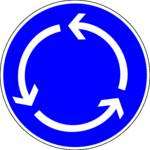Traffic circles may become widespread

Modern roundabouts, or traffic circles, not only reduce crashes, but research shows they also can help alleviate traffic backups and resulting delays.
Researchers say roundabouts improve traffic flow and reduce injury crashes by as much as 75 percent, compared with intersections controlled by stop lights or signs.
Although tens of thousands of traffic circles have been built worldwide, only about 1,000 exist in the United States.
"Transportation engineers, like everybody else, generally go with what they're used to," said Richard Retting of the Insurance Institute for Highway Safety. "Doing this means missing the benefits of roundabouts."
Institute researchers compared such factors as traffic volume, the number of accidents, and traffic delays at traditional intersections, with those occurring at the more modern traffic circles.
A key finding is that vehicle delays would be reduced by up to 74 percent, saving 325,000 hours of motorists' time annually. The scientists estimated crashes could be reduced by 75 percent.
"If only 10 percent of the 250,000 intersections with signals in the United States were modified as roundabouts, the national safety and fuel saving benefits would be enormous," Retting said.
The research appears in the institute's journal, Status Report.
Copyright 2005 by United Press International

















